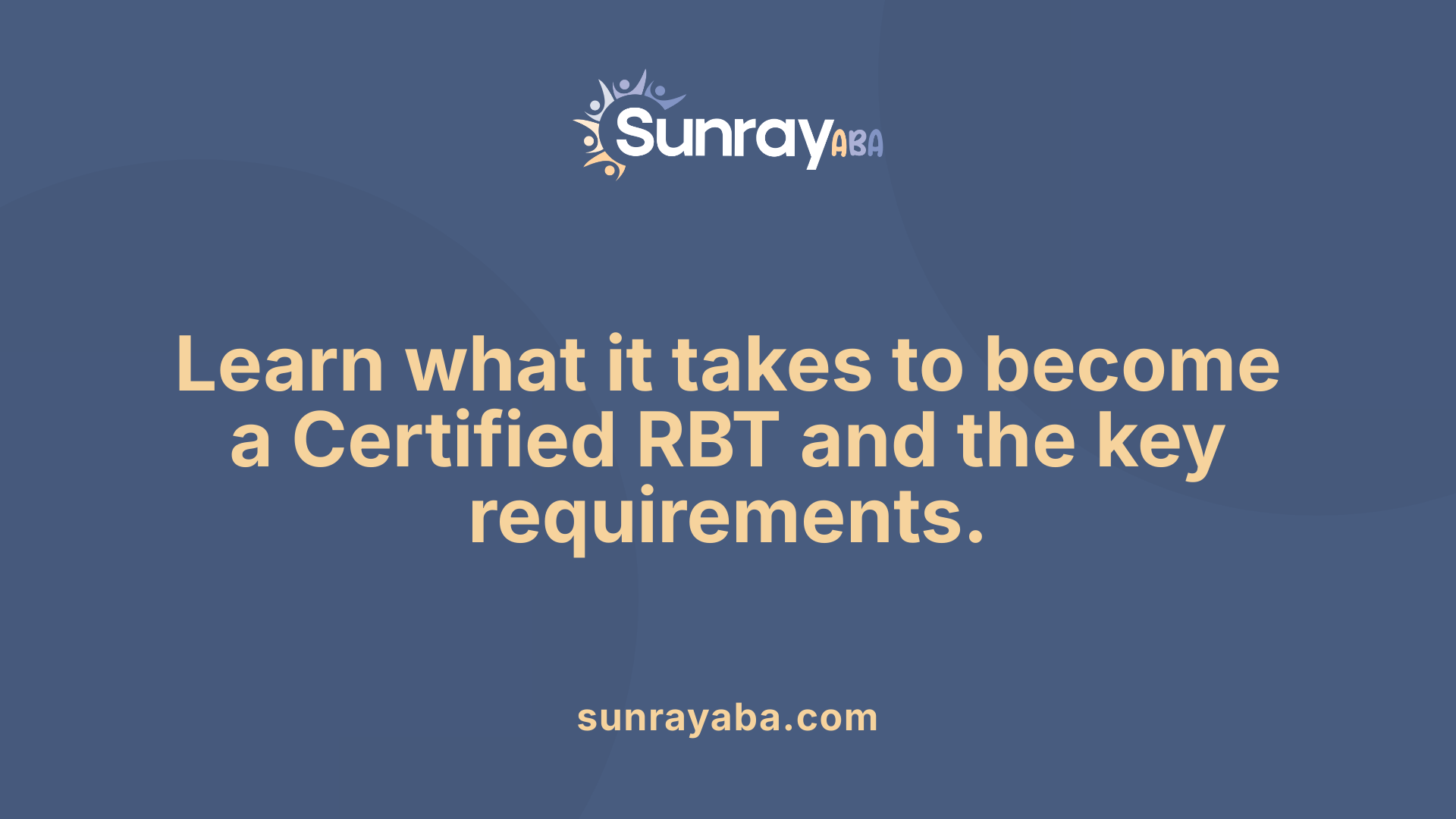Find Free RBT Training Near You

Embark on Your Journey to Becoming an RBT
The demand for qualified Registered Behavior Technicians (RBTs) is steadily growing, especially for those passionate about making a meaningful impact in the lives of individuals with developmental challenges. If you're seeking to start or advance your career in this field, understanding how to find free or affordable training options is crucial. This guide explores the pathway to RBT certification, highlighting accessible training resources, including free programs and university offerings, and detailing the certification process and ongoing professional requirements.
Understanding RBT Certification and Its Requirements

What is an RBT certification, and what are the requirements to obtain it?
The Registered Behavior Technician (RBT) certification is a credential designed for paraprofessionals who support the implementation of behavior-analytic services. This certification enables individuals to assist in providing therapy and behavioral interventions under supervision, playing a vital role in applied behavior analysis (ABA).
To qualify for RBT certification, candidates must meet several criteria. First, they need to be at least 18 years old and possess a high school diploma or an equivalent qualification. A crucial step involves completing a 40-hour training program that aligns with the RBT Task List (2nd Edition). For example, Florida Tech offers such a program called 'Behavior Analysis Essentials,' which is an online course that prepares students for the certification process.
This program is offered by an accredited university and covers essential topics like ABA introduction, measurement, data collection, verbal behavior, reinforcement, skill acquisition, functional assessment, behavior reduction, and responsible conduct. It also includes exam preparation resources such as practice tests, which boast high success rates for first-time exam takers.
Following training, applicants must pass a competency assessment conducted by a Board Certified Behavior Analyst (BCBA). This assessment verifies practical understanding and skills that are critical for responsible service delivery. Next, candidates need to complete the BACB application, submitting all required documentation, including proof of training and assessment success.
The next step involves passing the BACB’s certification exam. This exam tests knowledge across several behavior analysis domains, ensuring candidates are prepared to implement ABA techniques correctly.
Maintaining the RBT credential requires ongoing supervision, typically at least 5% of hours worked per month, and annual renewal processes. During renewal, RBTs must demonstrate continued adherence to ethical standards, often involving supervised work documentation and possibly additional training.
In summary, obtaining and maintaining an RBT credential involves a structured process that emphasizes both initial education and ongoing professional development. The integration of accredited online training programs, like Florida Tech's, along with rigorous assessment and supervision, helps ensure qualified practitioners deliver effective behavioral interventions.
Exploring Affordable and Free RBT Training Resources

Are there free or affordable options for RBT training and resources?
Yes, many options are available for individuals seeking to meet the Behavior Technician (RBT) certification requirements without incurring high costs. One prominent free option is the Autism Partnership Foundation’s online RBT training program. This comprehensive 40-hour course is offered at no charge and aligns with the BACB’s training standards, making it a popular choice among aspiring RBTs. Since its launch in 2020, more than 80,000 participants have enrolled, highlighting its accessibility and value.
Beyond free resources, there are reasonably priced courses offered by various platforms. Relias Academy and Verbal Behavior Institute, for instance, provide RBT training starting at around $99. These platforms deliver structured content designed to prepare candidates effectively for certification, including quizzes, videos, and interactive exercises.
University-based programs also offer affordable pathways to RBT certification. Florida Tech’s online “Behavior Analysis Essentials” program, for example, costs approximately $300–$510. This 40-hour course is accredited by a university and aligns with the RBT Task List (2nd Ed.), ensuring it meets the BACB’s educational standards. It incorporates exam preparation resources such as practice tests, which help participants gauge their readiness.
Additionally, institutions like the University of Kansas and other online universities provide specialized courses that support learners through coursework, competency assessments, and exam prep, often at similar or slightly higher price points. These options not only make the pathway to certification accessible but also ensure that the training meets both academic and professional standards.
In summary, whether opting for free programs or affordable courses offered by private providers and universities, prospective RBTs have multiple cost-effective avenues to complete the required 40-hour training and start their journey in behavior analysis.
How to Find the Right RBT Training Program for You
 When looking to become a Registered Behavior Technician (RBT), choosing the right training program is essential for success. Many options are available, including online courses, in-person workshops, and community-based programs.
When looking to become a Registered Behavior Technician (RBT), choosing the right training program is essential for success. Many options are available, including online courses, in-person workshops, and community-based programs.
Online courses have gained popularity for their flexibility and comprehensive content. For example, Florida Tech offers a 40-hour online 'Behavior Analysis Essentials' program designed to meet the standards set by the Behavior Analyst Certification Board (BACB). This program is hosted by an accredited university and aligns with the RBT Task List (2nd Ed.), covering the core areas necessary for certification.
These online programs often feature engaging modules, videos, and practice tests, helping candidates prepare effectively for the certification exam. Additional resources like practice tests are provided to improve the chances of passing on the first attempt. The structure allows learners to study at their own pace, which is ideal for professionals balancing work or personal commitments.
In-person and community training workshops can also provide valuable hands-on experience and direct interaction with instructors. These are especially useful for learners who prefer practical demonstrations and real-time feedback.
When selecting a program, ensure it is BACB-approved. These programs meet the educational requirements for the RBT exam and ensure the training content adheres to professional standards. Matching training options to your learning style—whether you favor online, in-person, or a combination—can help increase engagement and retention.
To summarize, exploring options such as online courses, like Florida Tech’s program, or community workshops, and confirming their accreditation or approval status, helps set the foundation for successful certification.
For further research, search for 'RBT training options online and community-based' to discover a variety of programs tailored to different needs and preferences.
Steps to Become a Certified RBT

What are the steps to get trained and certified as an RBT?
Becoming a Registered Behavior Technician (RBT) involves several clear steps. The first step is meeting eligibility prerequisites. Candidates must be at least 18 years old, possess a high school diploma or its equivalent, and successfully pass a background check.
Once eligibility is confirmed, the next step is completing a 40-hour training program approved by the BACB. Florida Tech offers an online course called 'Behavior Analysis Essentials' that fulfills this requirement. This program is designed to align with the RBT Task List (2nd Ed.) and covers fundamental topics needed for certification, such as introduction to ABA, data collection, reinforcement strategies, and behavior reduction techniques.
After finishing the training, candidates must demonstrate practical competence through a competency assessment. This is usually conducted by a qualified supervisor, such as a BCBA, who verifies the candidate's skills across various tasks.
Following successful competency assessment, the individual can apply for certification via the BACB. This process involves submitting documentation and passing the BACB certification exam, which can be scheduled through Pearson VUE. The program also provides additional resources, including practice tests, to prepare for the exam.
Finally, maintaining certification requires ongoing supervision, earning Continuing Education Units (CEUs) annually, and renewing the credential before the expiration date. This ensures RBTs stay current with professional standards and best practices in behavior analysis.
Importance and Benefits of RBT Certification
What are the benefits and importance of obtaining RBT certification?
Obtaining Registered Behavior Technician (RBT) certification is a vital step for those working in applied behavior analysis (ABA). It serves as a formal recognition of a professional’s knowledge and skills, which can boost credibility within the field and among clients and colleagues.
One of the main advantages of this certification is its role in unlocking a wide range of employment opportunities. RBTs are employed in diverse environments such as schools, clinics, homes, and community programs. This versatility allows professionals to find roles that fit their interests and strengths while making a significant impact on individuals receiving services.
The certification also provides a clear pathway for career development. Many RBTs advance their careers by pursuing higher-level certifications like BCBA (Board Certified Behavior Analyst) or BCaBA (Board Certified Assistant Behavior Analyst). These further credentials open doors to supervisory roles, increased responsibilities, and better compensation.
Salary and professional growth are notable benefits as well. RBTs often enjoy competitive wages and opportunities for ongoing education and specialization. Maintaining certification encourages adherence to professional ethics and standards set by the Behavior Analyst Certification Board (BACB), fostering trust and respect in the ABA community.
Additionally, the pathway to certification involves comprehensive training aligned with the RBT Task List, including courses like Florida Tech's 40-hour online 'Behavior Analysis Essentials.' This program covers essential topics such as behavior measurement, reinforcement, skill acquisition, and ethical conduct, ensuring candidates are well-prepared for the certification exam and their roles.
In summary, RBT certification enhances a professional’s credibility, broadens employment options, supports career advancement, and promotes ongoing professional development, making it a valuable credential in the ABA field.
Ongoing Requirements for RBT Certification Maintenance
What are the ongoing requirements to maintain RBT certification?
Maintaining Registered Behavior Technician (RBT) certification involves several essential ongoing requirements outlined by the Behavior Analyst Certification Board (BACB). First, RBTs must complete 20 continuing education units (CEUs) each year to stay current with best practices and professional standards. Of these, at least 3 CEUs should focus on topics related to client dignity and rights, emphasizing the importance of ethical and respectful treatment.
Supervision plays a vital role in certification maintenance. RBTs are required to engage in ongoing supervision, which includes at least two face-to-face contacts per month with a qualified supervisor. Additionally, supervision must cover at least 5% of the RBT’s total service hours each month to ensure proper oversight and support.
Adherence to ethical standards is another crucial aspect. RBTs must follow the BACB’s Ethical Code, which includes guidelines to ensure ethical conduct in all aspects of practice. If concerns or issues arise, RBTs are expected to self-report them to maintain transparency and uphold professional integrity.
The renewal process is an annual requirement. RBTs must submit a renewal application along with documentation of supervision hours and any required fees before the certification’s anniversary date. It’s recommended that practitioners retain supervision records for a minimum of seven years to provide proof of compliance if ever reviewed.
Finally, staying informed about updates in BACB policies and regulations is essential for ongoing compliance. By meeting these standards, RBTs demonstrate their commitment to ethical practice and continued professional development.
Training Modalities and Their Suitability
What are the different training options available for RBTs, such as online or community-based programs?
Training for Registered Behavior Technicians (RBTs) is accessible through various formats, each catering to different learning preferences and schedules. The most common options include fully online courses, in-person workshops, and hybrid programs that combine both.
Online training programs, like Florida Tech’s 'Behavior Analysis Essentials,' provide comprehensive, flexible learning opportunities. This particular 40-hour course is delivered entirely online and aligns with the BACB’s RBT Task List (2nd Edition), ensuring it meets the certification requirements. Such courses are equipped with interactive activities, practice tests, and detailed modules covering essential topics like ABA principles, behavior management, data collection, and ethics.
In contrast, in-person workshops and community-based programs offer direct, hands-on experiences. These formats often include live demonstrations, real-time feedback, and personalized mentorship, making them suitable for learners who benefit from immediate interaction and practical practice.
Hybrid models are gaining popularity for their balance of flexibility and practical learning. These programs typically involve completing online coursework supplemented by in-person sessions focusing on skill demonstrations and real-world application. This approach maintains the convenience of online learning while enhancing hands-on training.
Selecting the appropriate modality depends largely on your individual preferences, schedule constraints, and professional goals. Online courses like Florida Tech’s not only fit into busy schedules but also provide high-quality preparation supported by high first-time pass rates on BACB exams. In comparison, in-person options may suit those who prefer direct mentorship, while hybrids offer a middle ground.
In summary, whether you choose online, in-person, or hybrid training, it’s crucial to ensure the program is accredited or recognized within the BACB standards, adheres to the RBT Task List, and effectively prepares you for certification.
Understanding the Field of Behavior Technician Training and Certification

What should I know about the field of Behavior Technician training and certification?
The profession of Behavior Technician (BT) centers on applying Applied Behavior Analysis (ABA) techniques to support individuals with behavioral challenges. To become a Registered Behavior Technician (RBT), candidates need to complete specific training, demonstrate competence, and adhere to ethical standards.
One prominent training program is Florida Tech's 'Behavior Analysis Essentials,' a 40-hour online course designed expressly to meet the BACB's educational requirements for RBT certification. This program covers essential topics such as introduction to ABA, data collection and measurement, verbal behavior, reinforcement strategies, skill acquisition, functional behavioral assessments, behavior reduction, and professional responsibility.
The course content aligns with the RBT Task List (2nd Edition), ensuring that trainees acquire practical skills and theoretical knowledge necessary for effective practice. Even though the program is offered by an accredited university and is independent of the BACB, it maintains compatibility with its professional standards.
Supporting exam success, the course also provides additional resources like practice tests, contributing to high first-time pass rates among students pursuing RBT certification. Continual professional development and supervision are vital components for maintaining certification and staying current in the field.
As the demand for qualified behavior technicians increases, the pathway for career growth includes progressing toward higher levels of certification, such as BCBA or BCaBA, opening doors to more advanced roles within ABA.
Below is a summary table highlighting aspects of RBT training and certification:
| Aspect | Details | Additional Notes |
|---|---|---|
| Training Duration | 40 hours | Covers fundamental ABA concepts |
| Delivery Mode | Online | Flexibility for learners |
| Curriculum Focus | Behavior analysis principles, measurement, ethics | Based on RBT Task List 2nd Ed. |
| Certification Exam | BACB RBT exam | Supported by practice tests |
| Continuing Development | Supervision, renewal | Ensures ongoing competence |
Understanding these elements provides a solid foundation for individuals interested in pursuing a career as a Behavior Technician, emphasizing the importance of structured training, ethical practice, and ongoing education in ABA.
Begin Your Path Toward Certification Today
Aspiring behavior technicians can leverage numerous resources to achieve RBT certification, many of which are accessible at little to no cost. By understanding the requirements, exploring diverse training options, and selecting reputable programs like Florida Tech’s online course or free platforms such as the Autism Partnership Foundation, you can efficiently prepare for the certification exam. Remember, maintaining your certification is an ongoing commitment involving supervision and continuing education, ensuring that you stay compliant and proficient in delivering quality ABA services. Embark on your journey today and unlock meaningful career opportunities in the growing field of applied behavior analysis.
References
- Behavior Technician Training | Florida Tech
- 8 Benefits of Becoming an RBT: A Rewarding ABA Therapy Career
- 7 Advantages of RBT Certification and How You Can Make Full Use ...
- Should You Consider RBT Certification? - Blossom ABA
- [PDF] registered behavior technician® handbook | bacb
- Registered Behavior Technician (RBT) - BACB
- How to Become a Registered Behavior Technician (RBT) in Texas
- How to Become a Registered Behavior Technician (RBT)
- Behavior Technician Training | Florida Tech